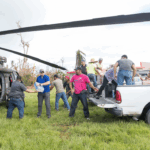A new study in Global Biogeochemical Cycles explores whether protecting ocean animals like fish, whales, and other marine life could help slow climate change. The authors reviewed current science to see how these animals store and move carbon in the ocean—a process that could help keep carbon out of the atmosphere. Grace Saba, an affiliate […]
Are Superfund Cleanups Keeping Up with Climate Change?
Over a thousand contaminated sites across the U.S. are so dangerous to people and the environment that they’ve been put on the federal Superfund list. These sites often sit near rivers, coasts, or in wildfire-prone areas. As climate change brings more flooding, stronger hurricanes, and more frequent wildfires, these old industrial sites could pose even […]
Teaching Climate Change in Spanish Helps Reach More Students
Derek Shendell, an affiliate of the Rutgers Climate and Energy Institute and professor in the Department of Environmental and Occupational Health and Justice at Rutgers School of Public Health, is co-author of a new study published in the Journal of Environmental Health. You can read the full study here1. Many students in New Jersey and across the […]
Mississippi River Disruptions Could Raise Food and Fertilizer Costs, Study Finds
When drought and extreme weather lower water levels on the Mississippi River, it doesn’t just slow boats—it can ripple through the whole economy. A new study in Risk Analysis shows how climate change–related disruptions to fertilizer shipments along the river can shrink GDP and raise prices, especially in states like Illinois and Minnesota. Fred Roberts, an […]
How Puerto Rican Communities Stepped Up After Hurricane María
When Hurricane María hit Puerto Rico in 2017, it left behind widespread destruction—no power, destroyed homes, and thousands dead. Many people felt abandoned by the government. But some local groups stepped up to take care of their neighbors when official help never came. In a new study published in Geoforum, the authors explore how two […]
Flying High to Find Drought-Resistant Grass
Zoysiagrass is a popular lawn choice because it looks great and handles heat fairly well—but it still struggles in dry conditions. A new study is using drones and advanced imaging technology to find out which types of zoysiagrass do best when water is scarce. Bingru Huang, Distinguished Professor in the Department of Plant Biology and […]
Building Fair Climate Solutions: What We Can Learn from Washington and Colorado
Todd Vachon, an affiliate of the Rutgers Climate and Energy Institute, is a co-author of a new study that explores how different groups—like labor unions, environmental advocates, and community organizations—can work together to create fair and effective climate policies. The study, published in Environmental Politics, compares two major efforts in Washington State and Colorado to build […]
Helping People Spot Greenwashing: A New Tool to Tell Truth from Hype
Greenwashing—when companies make themselves look more eco-friendly than they really are—is becoming a serious problem as the world tries to tackle climate change. A new study helps people understand when a company is being honest about going green and when it’s just using “green” talk to distract or mislead. The study, published in Ecology and […]
New Catalyst Breakthrough Could Make Clean Ammonia Easier to Produce
Producing ammonia—a key ingredient in fertilizer and a promising hydrogen energy carrier—traditionally requires lots of energy and fossil fuels. But a new study offers a more efficient, greener method for making ammonia using only nitrogen from the air and water, with help from electricity. Huixin He, associate professor in the School of Arts and Sciences, […]
Clams Grew Slower in Warmer Ancient Seas, Study Finds
A new study reveals that warmer oceans thousands of years ago slowed the growth of an important clam species in the Adriatic Sea—giving us a glimpse into how marine life might react to future climate change. Fiorella Prada, assistant professor in the Department of Marine and Coastal Sciences and affiliate of the Rutgers Climate and Energy […]











